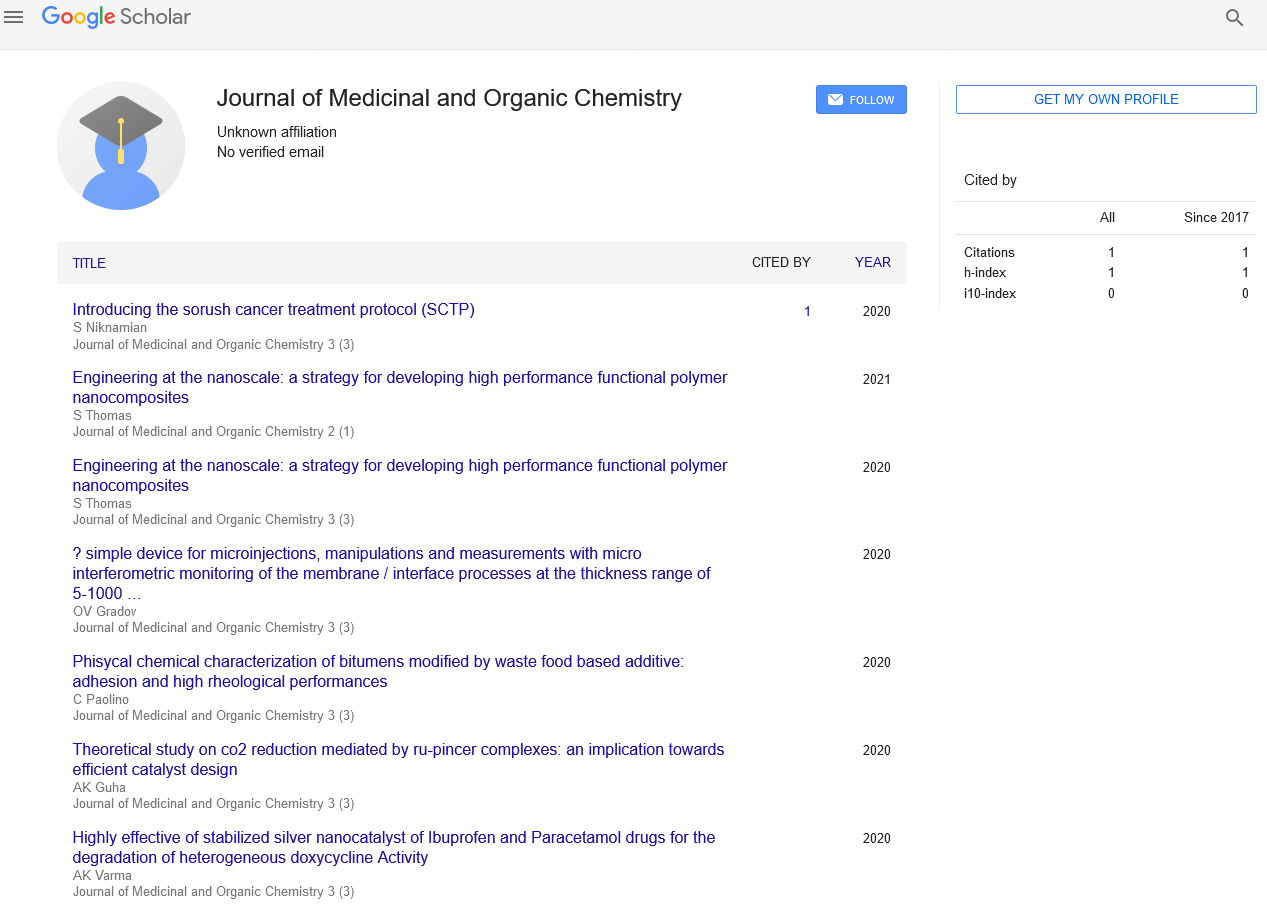Perspective - Journal of Medicinal and Organic Chemistry (2023) Volume 6, Issue 6
Delivering Excellence: The Imperative of Quality Healthcare Services
- Corresponding Author:
- Rosin O Flahrty
Department of Hospital Management ,
Tryniti University,
Cork,
Ireland
E-mail: Rosin.OFlahrty@mu.ie
Received: 15-Nov-2023, Manuscript No. jmoc-23-121598; Editor assigned: 21-Nov-2023, PreQC No. jmoc-23-121598 (PQ); Reviewed: 06-Dec-2023, QC No. jmoc-23- 121598; Revised: 13-Dec-2023, Manuscript No jmoc-23-121598 (R); Published: 29-Dec-2023, DOI: 10.37532/jmoc.2023.6(6).153-154
Introduction
In the tapestry of human well-being, the provision of quality healthcare services stands as a fundamental pillar, influencing not only the treatment of diseases but also the overall health outcomes and satisfaction of individuals. Quality healthcare goes beyond mere diagnosis and treatment; it encompasses a holistic approach that considers patient experiences, safety, effectiveness and equitable access to care. This article delves into the multifaceted landscape of quality healthcare services, exploring its essential components, the challenges it faces and the imperative of placing patients at the center of the healthcare journey.
Description
Defining quality healthcare services
Quality healthcare is a comprehensive concept that goes beyond the absence of illness. The institute of medicine defines quality in healthcare as the degree to which health services for individuals and populations increase the likelihood of desired health outcomes and are consistent with current professional knowledge. Key components of quality healthcare include safety, effectiveness, patient-centeredness, timeliness, efficiency and equity.
Safety: Ensuring the safety of patients is paramount in quality healthcare. This involves minimizing the risk of harm through the prevention of medical errors, infections and other adverse events.
Effectiveness: Quality healthcare services are based on evidence-based practices that have been proven to achieve the desired health outcomes. This includes the use of the latest medical knowledge and technologies to deliver efficient and beneficial care.
Patient-centeredness: Placing patients at the center of healthcare decisions and involving them in their care process is a hallmark of quality. Patient-centered care acknowledges individual preferences, values and needs, fostering a partnership between healthcare providers and patients.
Timeliness: Quality healthcare is prompt and timely, recognizing the importance of timely access to care in preventing and treating illnesses. Timeliness extends to waiting times, appointment scheduling and responsiveness in emergencies.
Efficiency: Efficient healthcare delivery minimizes waste and optimizes resources, ensuring that the right care is provided at the right time and in the most cost-effective manner.
Equity: Quality healthcare is equitable, providing care that does not vary in quality based on personal characteristics, such as race, ethnicity, gender, socioeconomic status or geographic location.
Challenges in ensuring quality healthcare
Access disparities: Disparities in access to healthcare services, both within and between countries, pose a significant challenge to ensuring quality care for all. Socioeconomic factors, geographical remoteness and cultural barriers can limit individuals’ ability to access timely and appropriate care.
Health information technology integration: While technological advancements hold great promise for improving healthcare, the integration of health information technology comes with challenges. Issues such as interoperability, data security and the effective use of electronic health records are areas that require continuous attention.
The imperative of patient engagement
Informed decision-making: Quality healthcare services empower patients to actively participate in their care by providing them with information about their health conditions, treatment options and potential outcomes. Informed decisionmaking enhances patient autonomy and contributes to better health outcomes.
Communication and shared decision-making: Effective communication between healthcare providers and patients is pivotal in delivering quality care. Shared decision-making, where providers and patients collaboratively decide on the best course of action, ensures that care aligns with individual preferences and values.
Continuous quality improvement
Feedback loops: Quality healthcare services thrive on feedback loops that facilitate continuous improvement. Patient feedback, performance metrics and outcome data are invaluable in identifying areas for enhancement and implementing changes to enhance the quality of care.
Benchmarking and best practices: Regularly benchmarking against industry standards and adopting best practices are essential for healthcare providers and institutions committed to delivering quality care. Learning from successful models and adapting strategies to local contexts contribute to ongoing improvements.
Technological innovations in healthcare quality
Telehealth and remote monitoring: The integration of telehealth services and remote patient monitoring allows for the delivery of healthcare beyond traditional settings. These technologies enhance access to care, particularly for individuals in remote areas or those with chronic conditions.
Data analytics for performance improvement: The use of data analytics enables healthcare providers to analyze vast amounts of information, identify trends and make data-driven decisions for performance improvement. Predictive analytics, in particular, can help anticipate patient needs and optimize resource allocation.
The future of quality healthcare
Holistic care models: The future of quality healthcare envisions holistic care models that consider not only physical health but also mental, emotional and social well-being. Integrating mental health services, preventive care and social determinants of health into healthcare delivery will be central to achieving holistic care.
Global collaboration: In an interconnected world, global collaboration is key to addressing health challenges. Collaborative efforts between countries, organizations and researchers facilitate the sharing of best practices, resources, and knowledge, contributing to improvements in healthcare quality on a global scale.
Conclusion
Quality healthcare services are not just a measure of medical competence but a reflection of a healthcare system’s commitment to the wellbeing and dignity of every individual it serves. As we navigate the complexities of modern healthcare, the imperative of prioritizing safety, effectiveness, patient-centeredness, timeliness, efficiency and equity becomes increasingly evident. By embracing innovation, engaging patients as partners, and fostering a culture of continuous improvement, healthcare providers and institutions can not only meet current challenges but also shape a future where the delivery of quality healthcare is a universal reality. In this pursuit, the true essence of quality healthcare lies not just in the absence of illness but in the presence of compassionate, personalized and effective care that empowers individuals to lead healthier lives.

